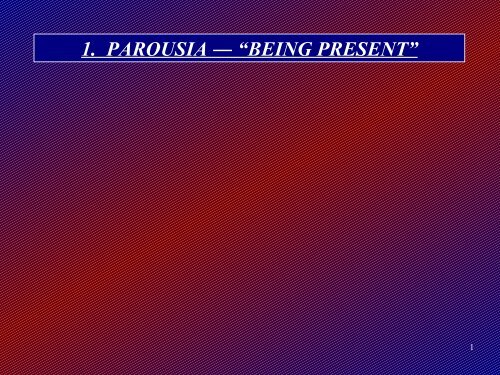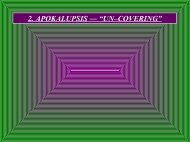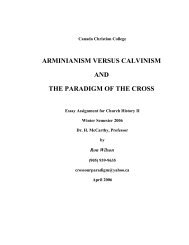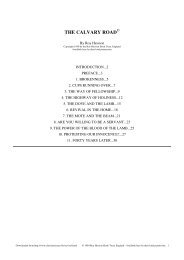1. PAROUSIA ― “BEING PRESENT” - Be Cruciform!
1. PAROUSIA ― “BEING PRESENT” - Be Cruciform!
1. PAROUSIA ― “BEING PRESENT” - Be Cruciform!
- No tags were found...
Create successful ePaper yourself
Turn your PDF publications into a flip-book with our unique Google optimized e-Paper software.
<strong>1.</strong> <strong>PAROUSIA</strong> <strong>―</strong> <strong>“BEING</strong> <strong>PRESENT”</strong>A. HISTORICAL AND ETYMOLOGICALMEANING OF <strong>PAROUSIA</strong>5
<strong>1.</strong> <strong>PAROUSIA</strong> <strong>―</strong> <strong>“BEING</strong> <strong>PRESENT”</strong>A. HISTORICAL AND ETYMOLOGICALMEANING OF <strong>PAROUSIA</strong> (cont.). . . Thus the English word “coming” as it is found inthe KJV and the NIV is not a satisfactory translationas “coming” does not necessarily indicate the fact ofstaying and visiting, thus tending to emphasize theaction of coming rather than the vital idea that Christis to be present with us for a period of time.7
<strong>1.</strong> <strong>PAROUSIA</strong> <strong>―</strong> <strong>“BEING</strong> <strong>PRESENT”</strong>A. HISTORICAL AND ETYMOLOGICALMEANING OF <strong>PAROUSIA</strong> (cont.)In secular Greek, parousia was often used on theoccasion of an official royal visit, such as when theRoman emperor made a parousia in the provinces inthe east. The roads were repaired; crowds flocked todo homage; there were processions, trumpet blasts,acclamations, speeches, petitions, gifts, and festivities.. . .8
<strong>1.</strong> <strong>PAROUSIA</strong> <strong>―</strong> <strong>“BEING</strong> <strong>PRESENT”</strong>A. HISTORICAL AND ETYMOLOGICALMEANING OF <strong>PAROUSIA</strong> (cont.). . . Often a new era was reckoned from the parousiaof the king or emperor, and coins were struck tocommemorate it. Note that the king was not passingthrough; he would stay for a period of time toestablish his authority of the region and set in placeauthority and policies for after his departure. You cansee the obvious picture here of Christ coming andresiding on earth to set up His Kingdom.9
<strong>1.</strong> <strong>PAROUSIA</strong> <strong>―</strong> <strong>“BEING</strong> <strong>PRESENT”</strong>A. HISTORICAL AND ETYMOLOGICALMEANING OF <strong>PAROUSIA</strong> (cont.)The disciples expected Jesus to take up a visible ruleover literal Israel; thus, they must have been thinkingabout a visible, physical appearance. Were theirconcepts correct? Should we also be looking only for afuture physical fulfillment, or are there ways thatChrist's spiritual presence (parousia(parousia) ) with us now canfulfill to some extent the intent of Scripture?10
<strong>1.</strong> <strong>PAROUSIA</strong> <strong>―</strong> <strong>“BEING</strong> <strong>PRESENT”</strong>A. HISTORICAL AND ETYMOLOGICALMEANING OF <strong>PAROUSIA</strong> (cont.)I am convinced that the concept of Christ's “coming”prevalent in the time of King James I influenced thetranslators of the KJV to use often the word “coming”for parousia. Scriptures below show that they used theword “presence” to translate parousia only when“coming” made no sense. My argument is that theyshould have consistently used “presence” or “visit”rather than “coming”.11
<strong>1.</strong> <strong>PAROUSIA</strong> <strong>―</strong> <strong>“BEING</strong> <strong>PRESENT”</strong>B. USES OF THE WORD <strong>PAROUSIA</strong> IN THENEW TESTAMENT12
<strong>1.</strong> <strong>PAROUSIA</strong> <strong>―</strong> <strong>“BEING</strong> <strong>PRESENT”</strong>B. USES OF THE WORD <strong>PAROUSIA</strong> IN THENEW TESTAMENT<strong>1.</strong> Christ's parousia at His transfiguration13
<strong>1.</strong> <strong>PAROUSIA</strong> <strong>―</strong> <strong>“BEING</strong> <strong>PRESENT”</strong>B. USES OF THE WORD <strong>PAROUSIA</strong> IN THENEW TESTAMENT<strong>1.</strong> Christ's parousia at His transfigurationWhen Peter in his epistle (2 Pet. 1:16-18) refers to thetransfiguration, he uses the word parousia for themanifestation of the glorious presence of Christ thathappened at that time--usually translated as “coming”.. . .14
<strong>1.</strong> <strong>PAROUSIA</strong> <strong>―</strong> <strong>“BEING</strong> <strong>PRESENT”</strong>B. USES OF THE WORD <strong>PAROUSIA</strong> IN THENEW TESTAMENT<strong>1.</strong> Christ's parousia at His transfiguration (cont.). . . However, note that this parousia lastedfor a period of time, with no reference to a special“coming” to the mount. Christ was already therebodily and remained after, but the parousia was abursting out for a time of a glorious presence that wasnot normally seen.15
<strong>1.</strong> <strong>PAROUSIA</strong> <strong>―</strong> <strong>“BEING</strong> <strong>PRESENT”</strong>B. USES OF THE WORD <strong>PAROUSIA</strong> IN THENEW TESTAMENT2. Paul's bodily parousia16
<strong>1.</strong> <strong>PAROUSIA</strong> <strong>―</strong> <strong>“BEING</strong> <strong>PRESENT”</strong>B. USES OF THE WORD <strong>PAROUSIA</strong> IN THENEW TESTAMENT2. Paul's bodily parousiaIn 2 Corinthians, (10:10), Paul reports that somepeople were saying that “his letters...are weighty andpowerful; but his bodily presence (parousia)) isweak...” Here it is obvious that parousia has nothingto do with the manner of Paul's traveling, but with hisphysical body being there for a time.17
<strong>1.</strong> <strong>PAROUSIA</strong> <strong>―</strong> <strong>“BEING</strong> <strong>PRESENT”</strong>B. USES OF THE WORD <strong>PAROUSIA</strong> IN THENEW TESTAMENT2. Paul's bodily parousia (cont.)In Philippians (2:12), Paul contrasts his parousia--hisbodily “presence”--with his physical “absence”: “...yehave always obeyed, not as in my presence (parousia)only, but now much more in my absence.” Paul's“coming” obviously was essential to his being there,but his physical presence for a time was his parousia.18
<strong>1.</strong> <strong>PAROUSIA</strong> <strong>―</strong> <strong>“BEING</strong> <strong>PRESENT”</strong>B. USES OF THE WORD <strong>PAROUSIA</strong> IN THENEW TESTAMENT3. The parousia of Paul and others in the NT19
<strong>1.</strong> <strong>PAROUSIA</strong> <strong>―</strong> <strong>“BEING</strong> <strong>PRESENT”</strong>B. USES OF THE WORD <strong>PAROUSIA</strong> IN THENEW TESTAMENT3. The parousia of Paul and others in the NTNote that, in the following verses, using the translation“coming” does not cause a problem because a visit isobviously shown by the context. However, notice thatthe word “visit” inserted in the following texts showsmore clearly the intended meaning:20
<strong>1.</strong> <strong>PAROUSIA</strong> <strong>―</strong> <strong>“BEING</strong> <strong>PRESENT”</strong>B. USES OF THE WORD <strong>PAROUSIA</strong> IN THENEW TESTAMENT3. The parousia of Paul and others in the NT (cont.)I am glad of the visit (“coming” parousia) ) ofStephanas and Fortunatus and Achaicus . . .(1Cor. 16:17)21
<strong>1.</strong> <strong>PAROUSIA</strong> <strong>―</strong> <strong>“BEING</strong> <strong>PRESENT”</strong>B. USES OF THE WORD <strong>PAROUSIA</strong> IN THENEW TESTAMENT3. The parousia of Paul and others in the NT (cont.)Nevertheless God, that comforteth those thatare cast down, comforted us by the visit(“coming” parousia) ) of Titus;(2 Co 7:6)22
<strong>1.</strong> <strong>PAROUSIA</strong> <strong>―</strong> <strong>“BEING</strong> <strong>PRESENT”</strong>B. USES OF THE WORD <strong>PAROUSIA</strong> IN THENEW TESTAMENT3. The parousia of Paul and others in the NT (cont.)That your rejoicing may be more abundant inJesus Christ for me by my visit (“coming”parousia) ) to you again.(Phil. 1:26)23
<strong>1.</strong> <strong>PAROUSIA</strong> <strong>―</strong> <strong>“BEING</strong> <strong>PRESENT”</strong>B. USES OF THE WORD <strong>PAROUSIA</strong> IN THENEW TESTAMENT4. The Lord's parousia likenened to periods of rain24
<strong>1.</strong> <strong>PAROUSIA</strong> <strong>―</strong> <strong>“BEING</strong> <strong>PRESENT”</strong>B. USES OF THE WORD <strong>PAROUSIA</strong> IN THENEW TESTAMENT4. The Lord's parousia likenened to periods of rainWhen James talks about the parousia (“comingcoming” ” --5:7-8) of the Lord, he pictures a farmer waiting forthe “former and latter rain” in order to reap the “fruitof the earth”. He is referring to the prophecy in Hosea6:3: “...he shall come unto us as the rain, as the formerand latter rain to the earth.” . . .25
<strong>1.</strong> <strong>PAROUSIA</strong> <strong>―</strong> <strong>“BEING</strong> <strong>PRESENT”</strong>B. USES OF THE WORD <strong>PAROUSIA</strong> IN THENEW TESTAMENT4. The Lord's parousia likenened to periods of rain(cont.). . . these rains lasted for a period of timeand, no doubt, refer to a period of blessing by the HolySpirit. Have we already experienced some of this“rain” in revivals such as the Welsh revival? Couldsuch times have been examples of the parousia ofChrist?26
<strong>1.</strong> <strong>PAROUSIA</strong> <strong>―</strong> <strong>“BEING</strong> <strong>PRESENT”</strong>B. USES OF THE WORD <strong>PAROUSIA</strong> IN THENEW TESTAMENT5. The Lord's parousia likened to the time ofNoah's flood (Matt. 24:37-41)As the flood “took all away” unexpectedly, so alsowhen the Lord will be present, , the ungodly will betaken away to judgment unexpectedly. Note this is atime of taking away the ungodly, not a secret raptureof the Church. . . .27
<strong>1.</strong> <strong>PAROUSIA</strong> <strong>―</strong> <strong>“BEING</strong> <strong>PRESENT”</strong>B. USES OF THE WORD <strong>PAROUSIA</strong> IN THENEW TESTAMENT5. The Lord's parousia likened to the time ofNoah's flood (Matt. 24:37-41) (cont.). . . In a similar passage in Luke, the term “dayS of theSon of Man” shows evidence that parousia alwaysrefers to a period of time-- “days”, not one “day”.There will be a period of time in which the ones in thefield or at the mill will be taken away in judgment, butfor each it will be totally unexpected. Note that it isnot the righteous who are taken away.28
<strong>1.</strong> <strong>PAROUSIA</strong> <strong>―</strong> <strong>“BEING</strong> <strong>PRESENT”</strong>B. USES OF THE WORD <strong>PAROUSIA</strong> IN THENEW TESTAMENT6. The Lord's parousia likened to the rising of thesun (Mat. 24:27)For as the [lightning][bright shining [of thesun] cometh out of the east, and shineth evenunto the west; so shall also the coming(“presence”<strong>―</strong> parousia) of the Son of man be.29
<strong>1.</strong> <strong>PAROUSIA</strong> <strong>―</strong> <strong>“BEING</strong> <strong>PRESENT”</strong>B. USES OF THE WORD <strong>PAROUSIA</strong> IN THENEW TESTAMENT6. The Lord's parousia likened to the rising of thesun (Mat. 24:27) (cont.)In this verse, the word “lightning” is obviously anincorrect translation of the Greek word astrape. Thisword is a general word for “bright shining” and onlymeans “lightning” when it is coupled with the word for“thunder”.30
<strong>1.</strong> <strong>PAROUSIA</strong> <strong>―</strong> <strong>“BEING</strong> <strong>PRESENT”</strong>B. USES OF THE WORD <strong>PAROUSIA</strong> IN THENEW TESTAMENT6. The Lord's parousia likened to the rising of thesun (Mat. 24:27) (cont.). . . Note its use in Luke 11:36: “If thy wholebody therefore be full of light, having no part dark, thewhole shall be full of light, as when the bright shining(astrape)of a candle doth give thee light.” . . .31
<strong>1.</strong> <strong>PAROUSIA</strong> <strong>―</strong> <strong>“BEING</strong> <strong>PRESENT”</strong>B. USES OF THE WORD <strong>PAROUSIA</strong> IN THENEW TESTAMENT6. The Lord's parousia likened to the rising of thesun (Mat. 24:27) (cont.). . . The word astrape is also used to describe thecountenance of an angel at the empty tomb. (Matt. 28:3)A bright, shining glory in his face would certainly bethe meaning, rather than bolts of lightning emanatingfrom his face.32
<strong>1.</strong> <strong>PAROUSIA</strong> <strong>―</strong> <strong>“BEING</strong> <strong>PRESENT”</strong>B. USES OF THE WORD <strong>PAROUSIA</strong> IN THENEW TESTAMENT6. The Lord's parousia likened to the rising of thesun (Mat. 24:27) (cont.)It seems that the picture of the rising of the sunemphasizes that all will see the brightness of thepresence of the Lord, just as the rising sun can be seenall the way to the western horizon. . . .33
<strong>1.</strong> <strong>PAROUSIA</strong> <strong>―</strong> <strong>“BEING</strong> <strong>PRESENT”</strong>B. USES OF THE WORD <strong>PAROUSIA</strong> IN THENEW TESTAMENT6. The Lord's parousia likened to the rising of thesun (Mat. 24:27) (cont.). . . The previousverse supports this interpretation as we are told not tobelieve those who invite us to find Christ “in the desert”or “in the inner rooms”. . . .34
<strong>1.</strong> <strong>PAROUSIA</strong> <strong>―</strong> <strong>“BEING</strong> <strong>PRESENT”</strong>B. USES OF THE WORD <strong>PAROUSIA</strong> IN THENEW TESTAMENT6. The Lord's parousia likened to the rising of thesun (Mat. 24:27) (cont.). . . Verse 30 of the same chapteremphasizes the public viewing of Christ by “all thenations of the earth. . . they will see the son of mancoming on the clouds of the sky with power and greatglory.”35
<strong>1.</strong> <strong>PAROUSIA</strong> <strong>―</strong> <strong>“BEING</strong> <strong>PRESENT”</strong>B. USES OF THE WORD <strong>PAROUSIA</strong> IN THENEW TESTAMENT7. Meeting the Lord “in the Air”36
<strong>1.</strong> <strong>PAROUSIA</strong> <strong>―</strong> <strong>“BEING</strong> <strong>PRESENT”</strong>B. USES OF THE WORD <strong>PAROUSIA</strong> IN THENEW TESTAMENT7. Meeting the Lord “in the Air”We can legitimately insert the word “presence” or“visit” for the word parousia in the following scripture;note how the verse conveys a different meaning thanmany Christians have assumed:37
<strong>1.</strong> <strong>PAROUSIA</strong> <strong>―</strong> <strong>“BEING</strong> <strong>PRESENT”</strong>B. USES OF THE WORD <strong>PAROUSIA</strong> IN THENEW TESTAMENT7. Meeting the Lord “in the Air” (cont.)For this we say unto you by the word of theLord, that we which are alive and remain untothe period of the presence / visit (“coming”parousia) ) of the Lord shall not prevent [precede]them which are asleep. (1Th 4:15)38
<strong>1.</strong> <strong>PAROUSIA</strong> <strong>―</strong> <strong>“BEING</strong> <strong>PRESENT”</strong>B. USES OF THE WORD <strong>PAROUSIA</strong> IN THENEW TESTAMENT7. Meeting the Lord “in the Air” (cont.)In all other scriptures, parousia refers to a visit on theearth; thus, it seems the word parousia indicates theLord shall be coming for a time of visiting with us hereon earth and that we are to be “caught up” as we “goout to meet Him” and show our welcome for our Kingas He begins His parousia on earth.39
<strong>1.</strong> <strong>PAROUSIA</strong> <strong>―</strong> <strong>“BEING</strong> <strong>PRESENT”</strong>C. SUMMARY OF CIRCUMSTANCES DURINGCHRIST'S <strong>PAROUSIA</strong>40
<strong>1.</strong> <strong>PAROUSIA</strong> <strong>―</strong> <strong>“BEING</strong> <strong>PRESENT”</strong>C. SUMMARY OF CIRCUMSTANCES DURINGCHRIST'S <strong>PAROUSIA</strong>As we look at all the events that seem associated with aparousia of Christ, they do not indicate a one shortvisit, but various periods of time, past, present, orfuture:41
<strong>1.</strong> <strong>PAROUSIA</strong> <strong>―</strong> <strong>“BEING</strong> <strong>PRESENT”</strong>C. SUMMARY OF CIRCUMSTANCES DURINGCHRIST'S <strong>PAROUSIA</strong><strong>1.</strong> A period of unexpected judgments:Matt. 24:3destruction of the temple, Jerusalem, wars,famines, earthquakes, persecution, deception,abomination in the "holy place"42
<strong>1.</strong> <strong>PAROUSIA</strong> <strong>―</strong> <strong>“BEING</strong> <strong>PRESENT”</strong>C. SUMMARY OF CIRCUMSTANCES DURINGCHRIST'S <strong>PAROUSIA</strong><strong>1.</strong> A period of unexpected judgments:Matt. 24:27-31falling of sun, stars, mourning of nations, gatheringof elect43
<strong>1.</strong> <strong>PAROUSIA</strong> <strong>―</strong> <strong>“BEING</strong> <strong>PRESENT”</strong>C. SUMMARY OF CIRCUMSTANCES DURINGCHRIST'S <strong>PAROUSIA</strong><strong>1.</strong> A period of unexpected judgments:Matt. 24:39unexpected taking away of individuals to judgment44
<strong>1.</strong> <strong>PAROUSIA</strong> <strong>―</strong> <strong>“BEING</strong> <strong>PRESENT”</strong>C. SUMMARY OF CIRCUMSTANCES DURINGCHRIST'S <strong>PAROUSIA</strong><strong>1.</strong> A period of unexpected judgments:2 Thess 2:8destruction of the wicked by His brightness45
<strong>1.</strong> <strong>PAROUSIA</strong> <strong>―</strong> <strong>“BEING</strong> <strong>PRESENT”</strong>C. SUMMARY OF CIRCUMSTANCES DURINGCHRIST'S <strong>PAROUSIA</strong>2. Glory, reign of Christ, resurrection, rejoicing46
<strong>1.</strong> <strong>PAROUSIA</strong> <strong>―</strong> <strong>“BEING</strong> <strong>PRESENT”</strong>C. SUMMARY OF CIRCUMSTANCES DURINGCHRIST'S <strong>PAROUSIA</strong>2. Glory, reign of Christ, resurrection, rejoicing1 Thess 2:19rejoicing in other saints47
<strong>1.</strong> <strong>PAROUSIA</strong> <strong>―</strong> <strong>“BEING</strong> <strong>PRESENT”</strong>C. SUMMARY OF CIRCUMSTANCES DURINGCHRIST'S <strong>PAROUSIA</strong>2. Glory, reign of Christ, resurrection, rejoicing1 Cor. 15:23resurrection of saints, reign of Christ48
<strong>1.</strong> <strong>PAROUSIA</strong> <strong>―</strong> <strong>“BEING</strong> <strong>PRESENT”</strong>C. SUMMARY OF CIRCUMSTANCES DURINGCHRIST'S <strong>PAROUSIA</strong>3. Spiritual work done by/during Christ's parousia49
<strong>1.</strong> <strong>PAROUSIA</strong> <strong>―</strong> <strong>“BEING</strong> <strong>PRESENT”</strong>C. SUMMARY OF CIRCUMSTANCES DURINGCHRIST'S <strong>PAROUSIA</strong>3. Spiritual work done by/during Christ's parousia1 Thess. 3:13strengthening in holiness "in" or “during” Christ'sparousia50
<strong>1.</strong> <strong>PAROUSIA</strong> <strong>―</strong> <strong>“BEING</strong> <strong>PRESENT”</strong>C. SUMMARY OF CIRCUMSTANCES DURINGCHRIST'S <strong>PAROUSIA</strong>3. Spiritual work done by/during Christ's parousia1 Thess 5:23spirit, soul, and body, preserved blameless “in“in” ” or“during” His parousia51
<strong>1.</strong> <strong>PAROUSIA</strong> <strong>―</strong> <strong>“BEING</strong> <strong>PRESENT”</strong>C. SUMMARY OF CIRCUMSTANCES DURINGCHRIST'S <strong>PAROUSIA</strong>3. Spiritual work done by/during Christ's parousia1 Thess 5:23spirit, soul, and body, preserved blameless “in“in” ” or“during” His parousiaC:\Documents and Settings\Administrator\My Documents\Koinonia\2. apokalupsis.ppt52






